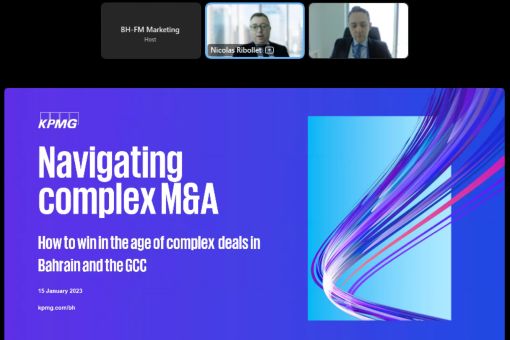
KPMG recently hosted a webinar for business leaders across key sectors in the marketplace in Bahrain, to discuss a pragmatic approach towards Mergers and Acquisitions (M&A) related activities. The business landscape, locally and globally, is becoming more complex because of the various market forces and trends. Currently, organizations are considering ‘deal-making’ as an efficient option to obtaining and expanding capabilities and staying competitive, without the hassle of having to build skills and capabilities ground up.
Nicolas Ribollet, Deal Advisory Partner at KPMG in Bahrain introduced the session and stated “M&A is considered a catalyst for growth and transformation within the marketplace, both at a global and national level. Digital transformation is influencing how businesses are evolving, and consumers are increasingly expecting a user-friendly experience in the Kingdom, the GCC region and globally. This means, to stay competitive, companies must consider new business models to be able to adapt with the fast-paced economy. A quick way to achieve this is to buy into existing capabilities. We are witnessing an increase in the number of acquisitions of technology-based companies by non-technology players, mostly within the Telecom and Financial Services sectors. We expect the volume of deals to continue to go up significantly in many sectors across Bahrain and the GCC region, in line with the economic diversification plans.”
Camille Geadah, Deal Advisory Director at KPMG in Bahrain, elaborated on the future potential of deal-making and said that the importance of “Environmental, Social and Governance (ESG) factors is increasing within the modern M&A world, and rapidly becoming a standard expectation from investors. Bahrain has recently joined the efforts and is collaborating with the other Gulf countries’ ESG and specifically ‘Green’ initiatives, in alignment with their 2060 ‘net-zero’ commitments. This will require direct involvement from the private sector, i.e., companies will have to acquire the right technology and capabilities to monitor and report on their carbon emissions. Doing so now and benefiting from ‘first mover’ advantage before the ‘Green’ agenda becomes a compliance requirement, will give the buyer/ seller a competitive advantage in the deals’ world where ESG is widely being recognised as the new intangible.”
During the webinar, the speakers discussed the findings of KPMG’s ‘Navigating complex M&A’ survey report which suggests five practical steps to improve the odds of success when they undertake a complex transaction:
1. Make strategic value your ‘north star’
The ultimate payoff from complex deals is often strategic value - new opportunities or new ways of doing business that build long-term value. These deals transcend traditional synergies. They are also a market signal to investors, customers, competitors, and employees - a stake in the ground that demonstrates conviction in a bold vision. The strategic goals of the transaction, therefore, must be clearly defined, widely supported from a stakeholder perspective, and pursued methodically and relentlessly.
2. Play offensive to win during diligence
Diligence should not be a ‘check in the box’ exercise to validate baseline assumptions. It’s your opportunity to identify even greater sources of value and explore the art of ‘what’s possible’ with target management. It’s also an opportunity to ensure that your own organization is clearly aligned around the key ‘levers of value’.
3. Get a ‘running start’ before Day 1
Complex deals demand a different approach to the ‘Day-1’ readiness - one with greater purpose, intensity, and speed. Sophisticated buyers use the ‘sign-to-close’ window to protect business momentum, find and mitigate blind spots, continue to seek even higher synergy upside, and accelerate tailored integration planning.
4. Adopt a people strategy for the times
More than ever, the value of a target lies in the capabilities, energy, and culture of its people. Tight and evolving labor markets raise the risk of losing talent—and reduce the likelihood of finding replacements quickly. To make complex deals work, you need a ‘people’ strategy fit for today’s talent realities, and a potential integration plan that focuses on preserving the success factors aligned to people, performance, and culture.
5. Think continuous value creation
Buyers define synergy targets at the outset, but they shouldn’t stop there. Be alert to new opportunities that arise and prepare to flex as markets, leadership, and strategies evolve. While it is critical to have a strong focus on risks and potential compliance related threats,
‘Value creation’ for the future is a strategic growth opportunity, which must not be sidelined.
The event took place online on Monday 16 January 2023.
